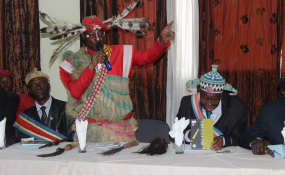
On April 28, 40 traditional leaders, representing all provinces of the DRC, convened in Gombe to demonstrate their commitment to addressing sexual violence in their local communities. During the training session, organized by the DRC’s Office of the Personal Representative in Charge of the Fight against Sexual Violence and Child Recruitment and the United Nations Population Fund (UNFPA), male and female chiefs participated in training on gender and sexual violence, and openly committed to leading transformative change in their own communities.
During her introduction of the stakeholders in attendance, Jeanine Mabunda, President Joseph Kabila’s Personal Representative on Sexual Violence and Child Recruitment, recognized that the workshop had been organized at the request of traditional leaders. “This workshop clearly aligns with Pillar VI of my office’s action plan, which aims to prevent sexual violence through the training of opinion leaders in local communities – they are critical to reaching our goal of zero tolerance for sexual violence across the DRC,” she added.
Diene Keita, a representative of UNFPA, noted that this activity presented an opportunity to interact with traditional leaders on key cultural principles, to support the condemnation and prevention of sexual violence, and to promote positive change which will help shift the paradigm.
In the DRC, sometimes traditional practices and views are used to justify acts of violence against women and girls, such as the forced marriages of minors. Further, victims of sexual violence are often stigmatized in their communities and even blamed for the actions of their assailant, making victims reluctant to speak out. While this workshop educated local leaders on the rights of women and girls, it has also empowered survivors of sexual violence by demonstrating to community leaders that blame rests with perpetrators, not victims.
“We thank the Office of the Personal Representative and UNFPA for organizing this activity. Everything we have learned will be shared with our people. You will not be disappointed. We also would like to ask that international partners allocate their support to assist victims across all provinces of the DRC, and not only in the East,” said Nyamayuku, President of the Customary Chiefs of the DRC and a traditional chief from Idiofa Territory in Bandundu province.
Confident that training would translate into tangible, transformative change, Nyamayuku suggested completing a comparative study of cases of sexual violence in communities before and after the workshop, which could be used to measure the real impact of the training.
“We met with other traditional leaders to expand our knowledge of how to lead our people and how to discuss sexual violence with them. Rape is something they should not dare to do – what was done before should not repeat itself because it is a great offense. This message will be faithfully transmitted throughout our villages,” said Marcel Mapio Esaka, a traditional leader of the North Bateke chieftaincy.
A chief from Mabenga Kikadi in Kasai Province said he was “very pleased to have completed the training on important lessons to pass on to our populations.” Rather than continuing traditional punishments for those who commit acts of sexual violence, which are often inadequate and can advance a culture of impunity, workshop participants were trained on the DRC’s existing laws and proper legal procedures, and were educated as to how they should respond in instances of rape.
Dr. Richard Mukendi spoke to participants about the suffering he has witnessed while treating victims of sexual violence as a medical examiner at Kintambo Hospital. “Sometimes people do not fully understand the concept of sexual violence and they force their daughters to marry, even as minors. After participating in this workshop, these leaders have received accurate information and are in a position to act on it. We hope that they will put a stop to negative customary practices which are contrary to the law,” said Dr. Mukendi.
The traditional leaders will return to their communities, where they will lead a six month training initiative on gender and sexual violence at the local level. After the conclusion of this training, the Office of the Personal Representative will launch a monitoring plan to ensure lessons from the workshop are upheld in these communities.
In 2014, President Joseph Kabila appointed Jeanine Mabunda to serve as Personal Representative in Charge of the Fight against Sexual Violence and Child Recruitment. Over the past two years, her office has worked to fight impunity, resource civilian and military justice systems, provide critical services to victims, empower women and girls, and mobilize society to stop sexual violence in the DRC. Jeune Afrique magazine has named her one of the 50 most influential African women.

